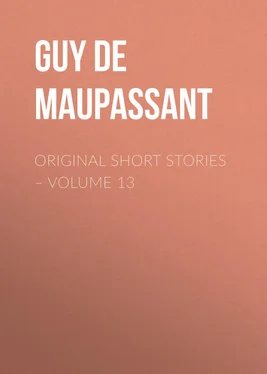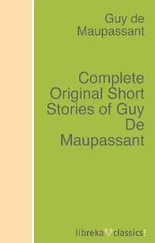Guy Maupassant - Original Short Stories – Volume 13
Здесь есть возможность читать онлайн «Guy Maupassant - Original Short Stories – Volume 13» — ознакомительный отрывок электронной книги совершенно бесплатно, а после прочтения отрывка купить полную версию. В некоторых случаях можно слушать аудио, скачать через торрент в формате fb2 и присутствует краткое содержание. Жанр: literature_19, foreign_antique, foreign_prose, на английском языке. Описание произведения, (предисловие) а так же отзывы посетителей доступны на портале библиотеки ЛибКат.
- Название:Original Short Stories – Volume 13
- Автор:
- Жанр:
- Год:неизвестен
- ISBN:нет данных
- Рейтинг книги:4 / 5. Голосов: 1
-
Избранное:Добавить в избранное
- Отзывы:
-
Ваша оценка:
- 80
- 1
- 2
- 3
- 4
- 5
Original Short Stories – Volume 13: краткое содержание, описание и аннотация
Предлагаем к чтению аннотацию, описание, краткое содержание или предисловие (зависит от того, что написал сам автор книги «Original Short Stories – Volume 13»). Если вы не нашли необходимую информацию о книге — напишите в комментариях, мы постараемся отыскать её.
Original Short Stories – Volume 13 — читать онлайн ознакомительный отрывок
Ниже представлен текст книги, разбитый по страницам. Система сохранения места последней прочитанной страницы, позволяет с удобством читать онлайн бесплатно книгу «Original Short Stories – Volume 13», без необходимости каждый раз заново искать на чём Вы остановились. Поставьте закладку, и сможете в любой момент перейти на страницу, на которой закончили чтение.
Интервал:
Закладка:
“Well, what do you say now?”
The father said nothing. The mother, less timid, exclaimed:
“She is too black. No, indeed, this is too much for me. It turns my blood.”
“You will get used to it,” said Antoine.
“Perhaps so, but not at first.”
They went into the house, where the good woman was somewhat affected at the spectacle of the negress engaged in cooking. She at once proceeded to assist her, with petticoats tucked up, active in spite of her age.
The meal was an excellent one, very long, very enjoyable. When they were taking a turn after dinner, Antoine took his father aside.
“Well, dad, what do you say about it?”
The peasant took care never to compromise himself.
“I have no opinion about it. Ask your mother.”
So Antoine went back to his mother, and, detaining her behind the rest, said:
“Well, mother, what do you think of her?”
“My poor lad, she is really too black. If she were only a little less black, I would not go against you, but this is too much. One would think it was Satan!”
He did not press her, knowing how obstinate the old woman had always been, but he felt a tempest of disappointment sweeping over his heart. He was turning over in his mind what he ought to do, what plan he could devise, surprised, moreover, that she had not conquered them already as she had captivated himself. And they, all four, walked along through the wheat fields, having gradually relapsed into silence. Whenever they passed a fence they saw a countryman sitting on the stile, and a group of brats climbed up to stare at them, and every one rushed out into the road to see the “black” whore young Boitelle had brought home with him. At a distance they noticed people scampering across the fields just as when the drum beats to draw public attention to some living phenomenon. Pere and Mere Boitelle, alarmed at this curiosity, which was exhibited everywhere through the country at their approach, quickened their pace, walking side by side, and leaving their son far behind. His dark companion asked what his parents thought of her.
He hesitatingly replied that they had not yet made up their minds.
But on the village green people rushed out of all the houses in a flutter of excitement; and, at the sight of the gathering crowd, old Boitelle took to his heels, and regained his abode, while Antoine; swelling with rage, his sweetheart on his arm, advanced majestically under the staring eyes, which opened wide in amazement.
He understood that it was at an end, and there was no hope for him, that he could not marry his negress. She also understood it; and as they drew near the farmhouse they both began to weep. As soon as they had got back to the house, she once more took off her dress to aid the mother in the household duties, and followed her everywhere, to the dairy, to the stable, to the hen house, taking on herself the hardest part of the work, repeating always: “Let me do it, Madame Boitelle,” so that, when night came on, the old woman, touched but inexorable, said to her son: “She is a good girl, all the same. It’s a pity she is so black; but indeed she is too black. I could not get used to it. She must go back again. She is too, too black!”
And young Boitelle said to his sweetheart:
“She will not consent. She thinks you are too black. You must go back again. I will go with you to the train. No matter – don’t fret. I am going to talk to them after you have started.”
He then took her to the railway station, still cheering her with hope, and, when he had kissed her, he put her into the train, which he watched as it passed out of sight, his eyes swollen with tears.
In vain did he appeal to the old people. They would never give their consent.
And when he had told this story, which was known all over the country, Antoine Boitelle would always add:
“From that time forward I have had no heart for anything – for anything at all. No trade suited me any longer, and so I became what I am – a night scavenger.”
People would say to him:
“Yet you got married.”
“Yes, and I can’t say that my wife didn’t please me, seeing that I have fourteen children; but she is not the other one, oh, no – certainly not! The other one, mark you, my negress, she had only to give me one glance, and I felt as if I were in Heaven.”
A WIDOW
This story was told during the hunting season at the Chateau Baneville. The autumn had been rainy and sad. The red leaves, instead of rustling under the feet, were rotting under the heavy downfalls.
The forest was as damp as it could be. From it came an odor of must, of rain, of soaked grass and wet earth; and the sportsmen, their backs hunched under the downpour, mournful dogs, with tails between their legs and hairs sticking to their sides, and the young women, with their clothes drenched, returned every evening, tired in body and in mind.
After dinner, in the large drawing-room, everybody played lotto, without enjoyment, while the wind whistled madly around the house. Then they tried telling stories like those they read in books, but no one was able to invent anything amusing. The hunters told tales of wonderful shots and of the butchery of rabbits; and the women racked their brains for ideas without revealing the imagination of Scheherezade. They were about to give up this diversion when a young woman, who was idly caressing the hand of an old maiden aunt, noticed a little ring made of blond hair, which she had often seen, without paying any attention to it.
She fingered it gently and asked, “Auntie, what is this ring? It looks as if it were made from the hair of a child.”
The old lady blushed, grew pale, then answered in a trembling voice: “It is sad, so sad that I never wish to speak of it. All the unhappiness of my life comes from that. I was very young then, and the memory has remained so painful that I weep every time I think of it.”
Immediately everybody wished to know the story, but the old lady refused to tell it. Finally, after they had coaxed her for a long time, she yielded. Here is the story:
“You have often heard me speak of the Santeze family, now extinct. I knew the last three male members of this family. They all died in the same manner; this hair belongs to the last one. He was thirteen when he killed himself for me. That seems strange to you, doesn’t it?
“Oh! it was a strange family – mad, if you will, but a charming madness, the madness of love. From father to son, all had violent passions which filled their whole being, which impelled them to do wild things, drove them to frantic enthusiasm, even to crime. This was born in them, just as burning devotion is in certain souls. Trappers have not the same nature as minions of the drawing-room. There was a saying: ‘As passionate as a Santeze.’ This could be noticed by looking at them. They all had wavy hair, falling over their brows, curly beards and large eyes whose glance pierced and moved one, though one could not say why.
“The grandfather of the owner of this hair, of whom it is the last souvenir, after many adventures, duels and elopements, at about sixty-five fell madly in love with his farmer’s daughter. I knew them both. She was blond, pale, distinguished-looking, with a slow manner of talking, a quiet voice and a look so gentle that one might have taken her for a Madonna. The old nobleman took her to his home and was soon so captivated with her that he could not live without her for a minute. His daughter and daughter-in-law, who lived in the chateau, found this perfectly natural, love was such a tradition in the family. Nothing in regard to a passion surprised them, and if one spoke before them of parted lovers, even of vengeance after treachery, both said in the same sad tone: ‘Oh, how he must have suffered to come to that point!’ That was all. They grew sad over tragedies of love, but never indignant, even when they were criminal.
Читать дальшеИнтервал:
Закладка:
Похожие книги на «Original Short Stories – Volume 13»
Представляем Вашему вниманию похожие книги на «Original Short Stories – Volume 13» списком для выбора. Мы отобрали схожую по названию и смыслу литературу в надежде предоставить читателям больше вариантов отыскать новые, интересные, ещё непрочитанные произведения.
Обсуждение, отзывы о книге «Original Short Stories – Volume 13» и просто собственные мнения читателей. Оставьте ваши комментарии, напишите, что Вы думаете о произведении, его смысле или главных героях. Укажите что конкретно понравилось, а что нет, и почему Вы так считаете.












